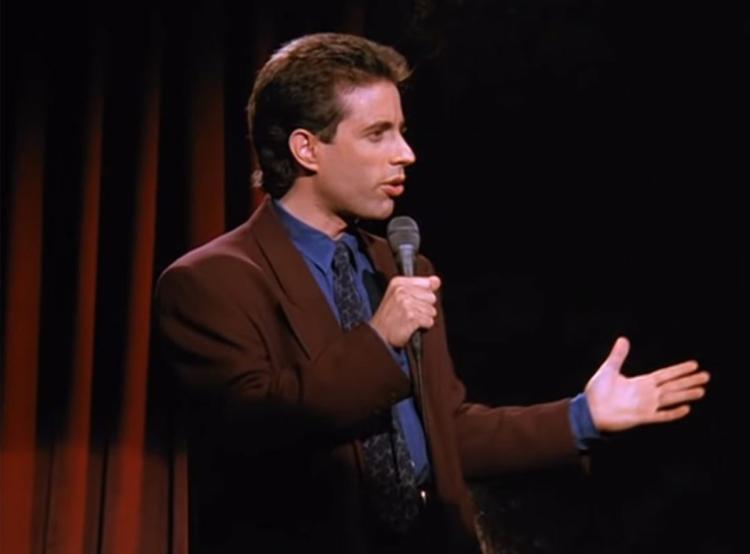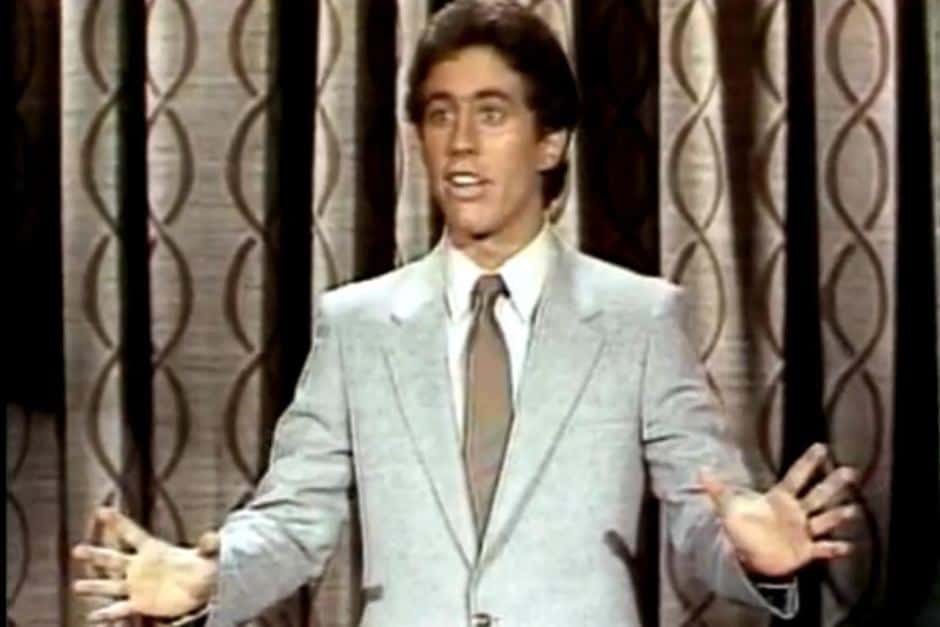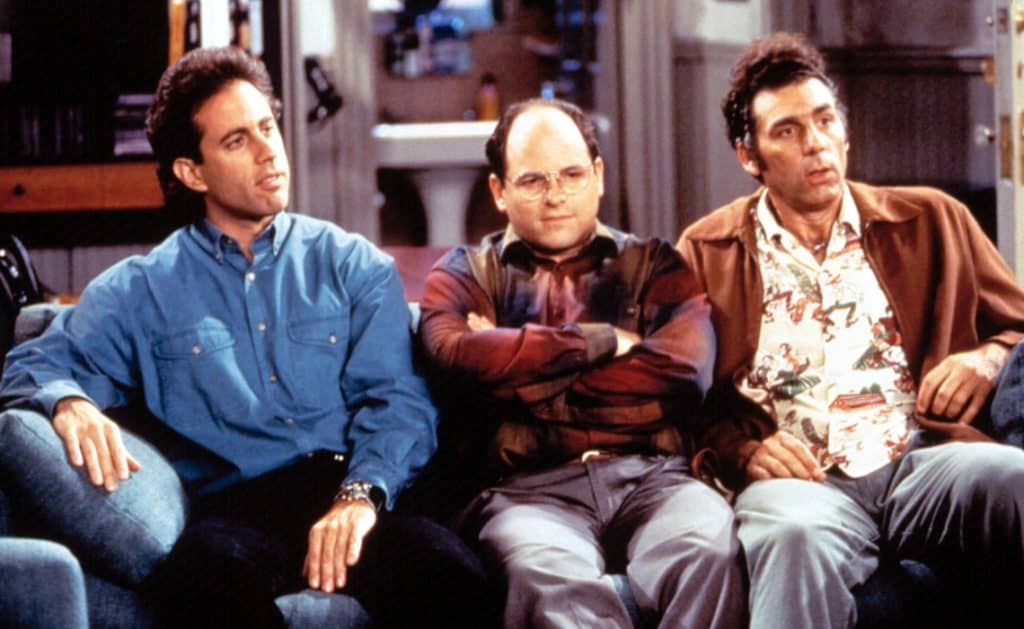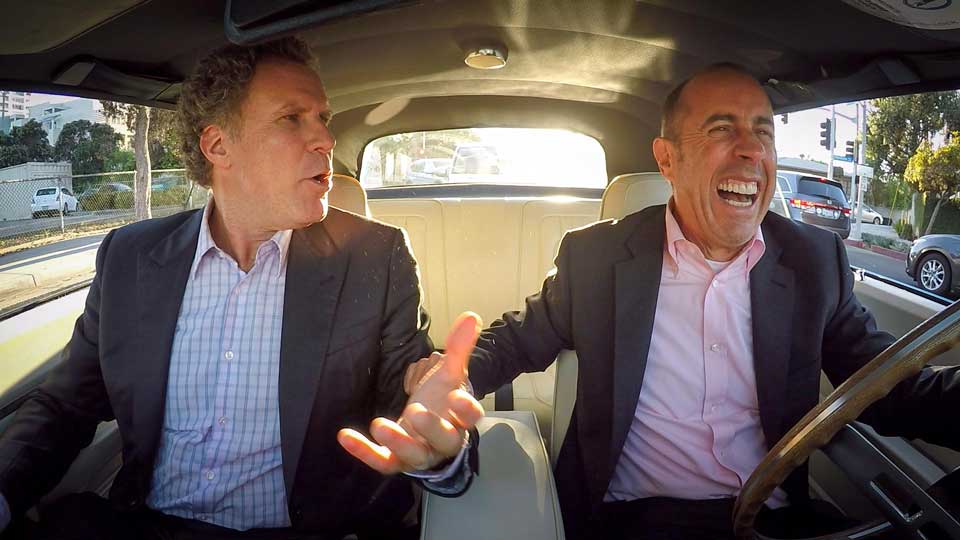Last year two stand up comedy legends, Bill Burr and Ritch Shydner were discussing what makes Jerry Seinfeld so special, recalling what it was like to tour the comedy circuit and see Seinfeld perform when he was still on his way up to the top.
Bill Burr: “I did a benefit in Beacon Theater. It was the sickest line up…
Seinfeld was closing. That was the line up.
And I remember when I was doing my set. I was conscious about not being too dirty because Seinfeld’s like the King, and I remember looking over, I was getting close to the end of my set…
And he was standing over to the side of the stage, and the light was behind him so he was like back lit.
And I knew who he was with his silhouette, that’s like how famous this guy is. And it wasn’t just Jerry hanging out. He had the suit on and it was Jerry ready to go to work.
And I was immediately thinking like ‘Oh my god, am I being too blue? Is he going to hate me? Am I pissing him off? Am I going over?’
And I remember when I got off stage, I walked by him and I was almost afraid to say hello. I just like walked by and he just went, ‘Very funny. Very funny.’
And then I apologized for you know, working the way I do. And he goes, ‘Ah, I don’t care.’ He almost like laughed, like ‘I don’t give a s***.’
And I’m thinking like that’s right, this guy always worked clean. And he worked clean before there was even comedy clubs.
So I can’t imagine him going on after these guys who would chug a beer and then burp and be like, ‘That’s what I learned in college.’
And like, that sort of energy is fun. But it whips ’em into this like frat boy frenzy. And then you gotta go up there.
And if you have like, more of a you know, straight laced kind of like, ‘Yeah I have a beer once in a while, but guys I’m not letting this totally affect my life…'”

Ritch Shydner: “Seinfeld always had that discipline. I remember working with him on these Jersey gigs. These Jersey gigs. These like $55 Jersey gigs to get started.
These were like the first paying gigs we could get, go out to Jersey in some bar. And so you know, it’s survival time in a bar, so a lot of guys would be like what do I got to do to get by?
You know? F*** with the crowd, ‘d***,’ ‘s***,’ d*** jokes, whatever I gotta do to get by. Right? And I remember working with Jerry one time, and he goes on, and he’d follow all that, and he stays right to what he’s doing man.
Works clean.”
Bill Burr: “Brings them to him.”
Ritch Shydner: “No, but he wasn’t killing!
It’s not like they all came to him. They were all like, ‘Oh wait a minute, the party’s over?’
It wasn’t great!
But he never broke. He never wavered.
And afterwards, I go, ‘Wow, man,’ and he goes:
‘I’m getting ready to do Tonight Shows. That’s what I’m preparing to do.’
He had the focus. He had the long range focus.
He was like, ‘I’m practicing this material here now, because I’m going to do this on the Tonight Show. I’m working this out now. I’m not worried about my $55 Jersey gig.’
Long range view.”
Bill Burr: “He’s one of those guys…
He just knew where he was going.
His act is the way he lives his life. There’s no fat. There’s no extra words…
And the guy just… he just walks towards what he wants…
Just eye on the prize, that guy.”
Ritch Shydner: “You know back in the day guys would go like, ‘You know what I don’t really like about his act? Cause you don’t really know who he is up there.’
I go, ‘Are you paying attention? You know exactly. You know what pisses this guy off? A missing sock in a dryer. That’s who he is.”

“The Show About Nothing”
Seinfeld co-wrote “The Seinfeld Chronicles” with comedian Larry David in 1988 to run on NBC. The network later renamed it to “Seinfeld.” Loosely based on Jerry himself and some people he knew, the show would be a sitcom based on the lives and relationships of a small group of friends living in New York City.
Along with Seinfeld playing a semi-fictional version of himself, a comedian trying to make his way in New York City, the show starred Saturday Night Live veteran Julia Louis-Dreyfus as well as seasoned actors Michael Richards and Jason Alexander. Alexander played George Costanza, a caricatured version of Larry David.
The show is often approvingly described as “a show about nothing,” because so much of its plots find drama, suspense, and humor in the minutiae of every day life. Very self aware, the show lampooned itself in later seasons with a very meta narrative of Jerry and his friend Costanza writing a “show about nothing” and getting interest from the networks in airing a pilot.

By the show’s fourth season, Seinfeld had rocketed to the top of the ratings and become the most cherished and commercially successful sitcom on American television. The final episode aired in 1998, and the show has enjoyed great success in syndicated reruns. It remains in syndication to this day. Reportedly, at the height of Seinfeld’s success, Jerry turned down a very lucrative contract of $5 million per episode for 22 episodes to continue the show for a tenth season.
Just like he knew what he wanted on his way to creating Seinfeld, Jerry knew how he wanted to go out: at the top of his game. The money didn’t matter. He was ready to retire Seinfeld before it got worn out. Always thinking several steps ahead of most people, by this point in his career, Jerry was interested in protecting his legacy. Between 2004 and 2007, Seinfeld’s former cast and crew members began recording episode commentaries for bonus material on the show’s DVD release. Jerry sat in for commentary on several episodes.
For many years after the series finale of Seinfeld in 1998- a television event only rivaled in sitcom viewership history, by the finales of M*A*S*H and Cheers -people wondered what Jerry Seinfeld was going to do next.
Comedians in Cars Getting Coffee
Not one to rest on laurels, though he certainly could at this point in his life, being the highest paid comedian in the history of the world from his Seinfeld earnings and other lucrative deals that have pushed Jerry Seinfeld’s net worth in excess of $800 million, Jerry’s most successful post-Seinfeld project has been a web series called Comedians in Cars Getting Coffee.
It’s a simple concept that fans went wild for. Jerry has a new comedian on for each episode, which is published on YouTube for people to watch on their computers and phones. He picks up each comedian in a different car, then takes them to a coffee shop for coffee, and viewers are treated to watching them talk, laugh, and regale each other. He envisioned it as a low key talk show, and that’s exactly what it is.

When Jerry’s contract with the show’s producer Crackle, was recently up, he started shopping for a new home for the project and decided on Netflix.
“When I first started thinking about ‘Comedians in Cars Getting Coffee,’ the entire Netflix business model consisted of mailing out DVDs in envelopes. I love that we are now joining together, both at very different points,” Seinfeld said in a statement on the deal.
Seinfeld’s contract with Netflix, which gives them ownership of the previously produced nine seasons of the show and the latest tenth season on top of future seasons, will also include two new Seinfeld stand-up comedy specials, all of which will be released in 2017. Netflix reportedly paid Seinfeld $100 million in the exchange. When his specials are released, Seinfeld will join A-list talent like Amy Schumer, Chris Rock, and Dave Chappelle who have all released specials on Netflix.
Seinfeld has said of the deal, “I am also very excited to be working with Ted Sarandos at Netflix. A guy and a place that not only have the same enthusiasm for the art of stand-up comedy as I do, but the most amazing technology platform to deliver it in a way that has never existed before. I am really quite charged up to be moving there.”
Comedy Zen
These days after wrapping up a day’s work writing and perfecting stand up routines in his Manhattan office, once or twice a week, Jerry will head out to some small time comedy club in New York or New Jersey and show up unannounced to make a surprise appearance and in the show’s line up for the night.
He owns a private jet, a personal collection of over 40 vintage Porsches, and keeps drawing over $32 million a year in earnings from his intellectual properties, but instead of sitting back and enjoying it all, he prefers to keep perfecting his comedy acts and trying out new lines or revised versions of old jokes on live audiences. He considers himself a scientist of comedy. Any joke you hear Seinfeld tell on his Netflix specials later this year has been tested, and workshopped and retested on audiences for months or even years until it’s perfect, until not a syllable is wasted. Jokes like: “Sometimes the road less traveled is less traveled for a reason.”
His comedy is so full of punch word for word, that it’s as if he’s transcended what we typically think of as comedy altogether, and now creates absurdist Zen koans:
“To a guy like me, a laugh is full of information. The timbre of it, the shape of it, the length of it. There’s so much information in a laugh. A lot of times, you could play me just the laughs from my set and I could tell you, from the laugh, what the joke was. Because they match.” -Jerry Seinfeld
